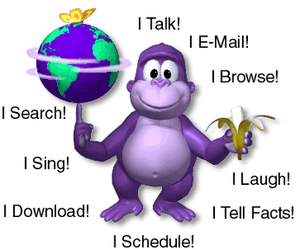BonziBuddy
 BonziBuddy promotional image | |
| Developer(s) | Bonzi Software, Inc. |
|---|---|
| Initial release | 1999 |
| Last release |
4.1.2
/ 2004 |
| Operating system | Microsoft Windows |
| Type | Adware, spyware |
| License | Freeware |
BonziBuddy, stylized as BonziBUDDY, was a desktop assistant made by Joe and Jay Bonzi. Upon a user's choice the on-screen agent would share jokes and facts, manage downloading using its download manager, sing songs and other functions.[1]
The software used Microsoft Agent technology similar to Office Assistant,[2] and originally sported Peedy, a green parrot and one of the characters available with Microsoft Agent. Later versions of BonziBuddy featured its own character: Bonzi, the purple gorilla.[3] The program also used a text to speech voice to interact with the user. The voice was called Sydney and taken from an old Lernout & Hauspie Microsoft Speech API 4.0 package. It is often referred to in some software as Adult Male #2.
Some versions of the software were described as spyware.[4] BonziBuddy was discontinued in 2004 after the company behind it faced lawsuits regarding the software and was ordered to pay fines.[5] Bonzi's website remained open after the discontinuation of BonziBuddy, but was later discontinued at the end of 2008.[6]
Criticism
In April 2007, PC World readers voted BonziBuddy the 6th on a list named: "The 20 Most Annoying Tech Products". One reader was quoted as criticizing the program because it "kept popping up and obscuring things you needed to see".[7]
One of the last newspapers to write about BonziBuddy while it was still in distribution described it as spyware and a "scourge of the Internet".[8] Another article found in 2006 on the BusinessWeek website described BonziBuddy as "the unbelievably annoying spyware trojan horse".[9]
Adware or spyware
A number of sources identify BonziBuddy as spyware, a claim the company disputes.[10] In 2002 an article in Consumer Reports Web Watch labelled BonziBuddy as spyware, stating that it contains a backdoor trojan in that it collects information from users. The activities the program is said to engage in include constantly resetting the user's web browser homepage to bonzi.com without the user's permission, prompting and tracking various information about the user, and serving advertisements.[11]
The Spyware Removal Database at Safer Networking (makers of Spybot – Search & Destroy) states "BonziBuddy is an Internet Explorer toolbar that may change your web browser settings, change your home page, and launch pop-up advertisements while tracking your web browsing habits."
Trend Micro and Symantec have both classified the software as adware.[12][13][14] Spyware Guide's entry on the program also states that it is adware.[15].
Legal
Internetnews.com reported the settlement of a class action suit on 27 May 2003. Originally brought against Bonzi Software on 4 December 2002, the suit accused Bonzi of using its banner advertisements to deceptively imitate Windows computer alerts, alerting the user that their IP address is being broadcast. In the settlement, Bonzi agreed to modify their ads so that they looked less like Windows dialog boxes and more like advertisements.[16][17]
On 18 February 2004, the Federal Trade Commission released a statement indicating that Bonzi Software, Inc. was ordered to pay $75,000 in fees, among other aspects, for violating the Children's Online Privacy Protection Act by collecting personal information from children under the age of 13 with BonziBuddy.[18]
See also
..
References
- ↑ "BonziBUDDY!". bonzi.com. Bonzi Software, Inc. Archived from the original on 21 June 2000.
- ↑ Hachman, Mark (28 May 2003). ""Bonzi Buddy" Creator Settles Suit". ExtremeTech. Ziff Davis. Retrieved 7 September 2006.
- ↑ "Counter Spy's entry on BonziBuddy". Archived from the original on 16 July 2011. Retrieved 7 September 2006.
- ↑ Geschwind, Bill (11 August 2004). "AppNote: Automating the installation and execution of Spybot Search & Destroy with ZENworks". Novell Cool Solutions. Novell. Retrieved 14 July 2007.
Hotbar, Bonzi Buddy, Gator eWallet and Comet Cursors ... are all spyware-laden programs that I have encountered far too often in the field on my users' machine
- ↑ Ravenscraft, Eric (18 August 2017). "A Brief History of BonziBuddy, the Internet's Most Friendly Malware". How-To Geek. Retrieved 23 December 2017.
- ↑ "Welcome to BONZI.COM!". 2008-07-24. Retrieved 2018-09-13.
- ↑ "The 20 Most Annoying Tech Products". PCWorld. Retrieved 29 September 2012.
- ↑ Kladko, Brian (21 March 2004). "Prying Eyes Lurk Inside Your PC; Spyware Spawns Efforts at Control". The Gale Group, Inc. Retrieved 16 November 2007.
- ↑ "Breaking: MySpace Backlash Sighted In Mainstream Media!". Businessweek. Bloomberg L.P. Archived from the original on 3 June 2011. Retrieved 16 November 2007.
- ↑ "BonziBuddy". Spyware Loop. 16 July 2013. Archived from the original on 28 April 2014. Retrieved 27 July 2013.
- ↑ Barrett, Robertson (21 November 2002). "Five Major Categories of Spyware". Consumer Reports. Consumers Union of U.S. Archived from the original on 9 January 2006. Retrieved 7 September 2006.
- ↑ "ADW_BONJING.A". trendmicro.com. Trend Micro. 8 July 2004. Archived from the original on 30 September 2007.
- ↑ "ADW_BONZIBUDDY.C". Threat Encyclopedia. Trend Micro. 8 June 2004. Retrieved 14 July 2007.
- ↑ "Adware.Bonzi". symantec.com. Symantec. 13 February 2007. Retrieved 5 April 2009.
- ↑ "BonziBuddy". Spyware Guide. Actiance. Retrieved 12 September 2017.
- ↑ Morrissey, Brian (27 May 2003). "Bonzi Settles Deceptive Ad Suit". internetnews.com. QuinStreet. Archived from the original on 6 June 2003. Retrieved 12 September 2017.
- ↑ Morrissey, Brian (4 December 2002). "Bonzi Hit With Deceptive-Ad Complaint". internetnews.com. QuinStreet. Archived from the original on 18 June 2003. Retrieved 12 September 2017.
- ↑ Schwartzman, Jen (18 February 2004). "UMG Recordings, Inc. to Pay $400,000, Bonzi Software, Inc. To Pay $75,000 to Settle COPPA Civil Penalty Charges". ftc.gov. Federal Trade Commission. Retrieved 12 September 2017.